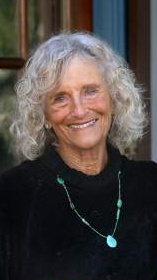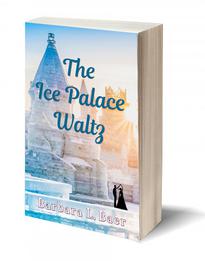©Moronic Ox Literary Journal - Escape Media Publishers / Open Books
Nostalgia
SUBMISSIONS
Moronic Ox Literary and Cultural Journal - Escape Media Publishers / Open Books Advertise your book, CD, or cause in the 'Ox'
Novel Excerpts, Short Stories, Poetry, Multimedia, Current Affairs, Book Reviews, Photo Essays, Visual Arts Submissions
My Mother's Romance
Gertrude Berg and the Goldbergs
by Barbara L. Baer
A month after the financial Crash of 1929, radio audiences across the country heard Molly Goldberg calling ‘Yoo Hoo” out her kitchen window for the first time. Over the next seventeen years, six days a week, through the difficult decades of the Depression and World War II, Gertrude Berg, the one-woman creator, script writer, director and star of The Goldbergs, spun stories around her homely philosophy, “From our family to your family.” Only in 1949, the show left radio for the new medium of television.
On the way down in the elevator, when my mother complimented the actress on how she’d read the ad copy for Sunshine Soap, Mrs Berg replied, “Your words made those soap bubbles come to life. I just added the hot water.”
In the wake of the Crash, my mother, a recent college graduate, was fortunate to have a job. Over the years, she would write ads for soaps, toothpaste and household cleaners. The household products weren’t only advertised in The Goldbergs: Molly and her family used the items during the show, perhaps the first instance of product placement. Mrs. Berg was nothing if not a smart marketer. From the beginning, she had complete control, writing the opening message and selecting the theme song “Toselli’s Serenade,” with its upbeat yet wistful melody. Few in her audience knew that she was not the first generation immigrant Molly Goldberg who made the malapropisms of new English speakers. “It’s late, Jake,” Molly said to her husband, “it’s time to expire.” In real life, Mrs. Berg lived on Park Avenue and spoke perfect English, but she had grown up in the Catskills where her father managed a hotel and encouraged her to perform sketches for the guests. Many relatives and Catskills old timers either inspired the sketches or turned up as actual characters.
Despite her own upward mobility, Gertrude Berg talked as an intimate friend to immigrants and their children, understanding how hard it was to give up traditions, memories, and food from the Old County. Her imagined kitchen was a safe warm place to forget for a moment the difficulties of being ‘greenhorns’—new Jewish immigrants—the unemployment and bread lines of the Depression. My mother remembered that when Molly spoke of kneading bread, a listener moved their own fingers, feeling the pliant dough between their hands, anticipating the fragrance as it baked. When Molly peeled spuds on the air, Mrs. Berg would use real potatoes and drop them into real boiling water. She fried up real eggs so the pan sizzled. The reason for this realism, Mrs. Berg wrote in her 1961 memoir, Molly and Me, was because there weren’t sound effects at the time that could imitate all she did around the house.
Once voted the second most admired American woman after Eleanor Roosevelt, President FDR himself is supposed to have said, “It wasn’t I who got us out of the Depression, it was The Goldbergs.” In her memoir, Molly and Me, Mrs. Berg wrote how surprised she was that many loyal listeners weren’t Jewish. In fact, The Goldbergs served as a way to familiarize non-Jews with Jewish life and was an antidote to anti-Semitism both before and during WW II. There were serious moments for Jews in the show—a rock thrown through a window at Passover, and after the war, remembering family lost to the Holocaust—but the focus was humor.
All the while my mother was writing the ads for the show, a dashing newspaper man she’d had a crush on in college was causing her sleepless nights. My father, like so many, had lost his job with the Crash. My mother, hiding her crush, got him hired at her agency. For many years, she was his pal not his girlfriend, as the handsome rogue who wore a fedora low on his brow took out actresses and survived his own Prohibition bathtub gin. At some point in the eight years they worked side by side, the friendship between them did become more, but not enough to keep him from spending nights drinking until dawn in the company of other women.
Here is where the writer of this story and of the family saga, The Ice Palace Waltz, steps in to create a scenario she doesn’t know is true, though there is logic to thinking that Gertrude Berg became a kind of yentl, a matchmaker, between my mother and father since the actress must have known how many years the younger woman carried the torch. My mother wanted a husband and children, though these words were never mentioned to my father for fear of scaring him off. At this point, with my mother in her early thirties, I can just see Gertrude Berg, feather in her hat, telling my mother over a post-Prohibition martini that this bachelor was not going to come through without a nudge. He needed a woman with a head not a dandelion on her shoulders but he just didn’t see it. What I do know for sure is that my mother delivered the ultimatum late one night in 1937: it had to be marriage or she couldn’t go on, and that my father got very drunk before calling to offer a less-than-romantic proposal, “I’ll go through with it.” They were married for life and died within months of each other nearly fifty years later.
As Gertrude Berg wrote in her memoir, “The best I can do is start at the beginning and hope. But starting at the beginning isn’t always that easy. People don’t just appear, they come from someplace. Everybody has ancestors and everybody is descended.” Remembering Mrs. Getrude Berg, I feel anscestored and descended.
Barbara L. Baer, author of The Ice Palace Waltz, Open Books, 2020
Barbara L. Baer received her BA and MA at Stanford University before going to South India to teach and study dance.
She has reviewed classical and contemporary dance for newspapers and periodicals in America and France.
Credits include fiction in Redbook and reportage for The Nation.
She lives in Sonoma County, California, where she and her husband, Michael, who is also a writer, cultivate pomegranates and olives.



